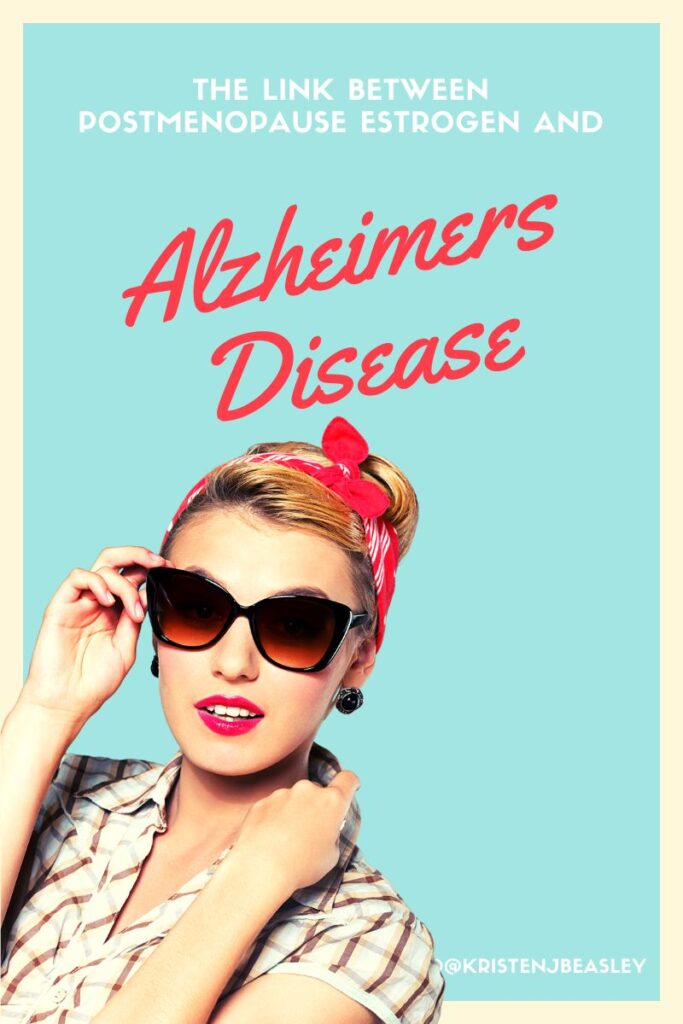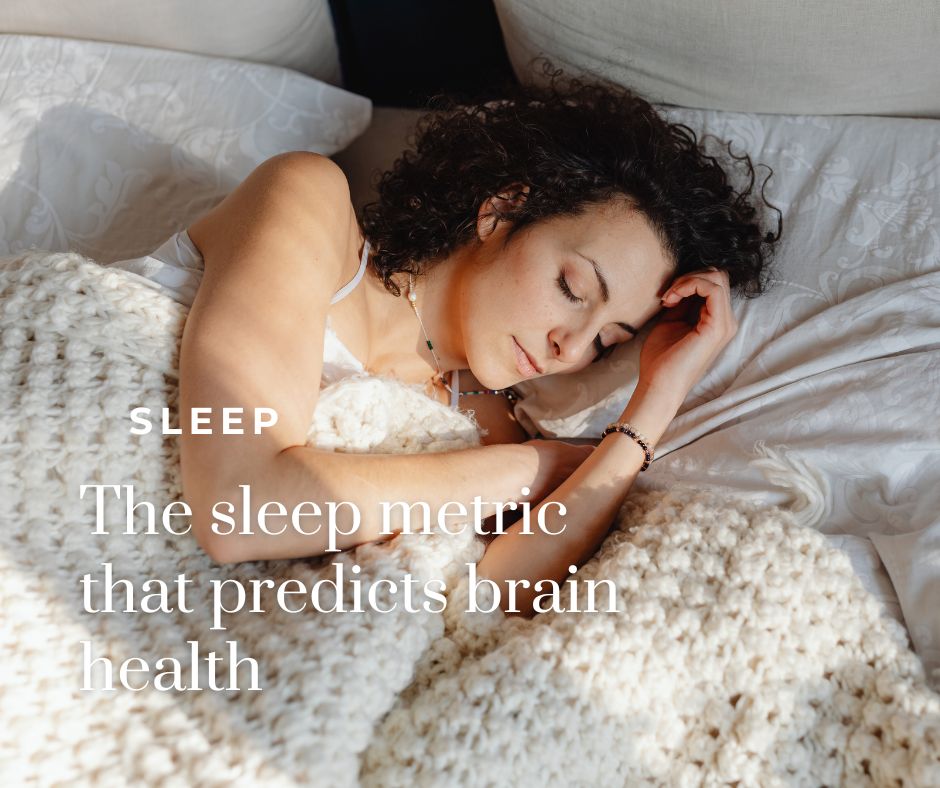By: Kristen J. Beasley

Menopause marks a significant shift in a woman’s life. It’s a time of powerful transitions, both physical and emotional. While it’s often accompanied by well-known symptoms like hot flashes and mood swings, there’s one critical change happening inside the body that doesn’t always get the spotlight it deserves—declining estrogen levels which emerging research suggests that this hormonal decline may play a role in increasing the risk of Alzheimer’s disease. Alzheimer’s disease a neurodegenerative condition that disproportionately affects women—nearly two-thirds of Americans living with Alzheimer’s are women. But why might this be the case, and what can you do to take proactive steps toward brain health as your hormones change?
This post dives into the fascinating and slightly complex connection between postmenopausal estrogen decline and Alzheimer’s risk. By understanding this link, you can take steps to optimize your health starting today.
Estrogen’s Role in Alzheimer’s and Brain Health
Estrogen isn’t just about reproduction. It’s a hormone with significant benefits for other parts of the body, including your brain. Estrogen helps regulate numerous cognitive functions, from memory to decision-making, thanks to its ability to stimulate new neuron connections and protect against inflammation.
It plays a crucial role in maintaining brain resilience by supporting synaptic plasticity— the process by which neurons communicate —and energy metabolism— the process by which the brain generates fuel, including glucose metabolism, mitochondrial function, and overall energy homeostasis. Estrogen is also known to reduce oxidative stress and increase blood flow to the brain, thereby protecting the blood-brain barrier from inflammation-induced disruption and maintaining barrier integrity, reducing neuroinflammation. Both of these effects are essential for optimal brain functioning.
When estrogen levels decline after menopause, the brain can lose some of these protective benefits. And in some cases, this might create a domino effect, leading to neuron damage associated with conditions like Alzheimer’s.
The Gender Disparity in Alzheimer’s
Statistically, women are at a higher risk of developing Alzheimer’s than men; even adjusting for longer lifetimes, women outnumber men 2:1 in the Alzheimer’s population. For a long time, this was thought to be due to life expectancy—women tend to live longer, and Alzheimer’s risk increases with age.
However, newer research reveals that longer life spans are only part of the equation. Postmenopausal estrogen decline might be a specific vulnerability factor for women. Studies indicate that women who undergo menopause earlier or who experience abrupt drops in estrogen due to surgical menopause might have an even higher risk of cognitive decline. When menopausal women experience various symptoms like hot flashes, night sweats, disturbed sleep, etc., they might not realize that these symptoms originate not in the ovaries but in the brain (Dr. Lisa Mosconi, Alzheimer’s and Women’s Health: an Urgent Call).
How Postmenopausal Estrogen Decline May Increase Alzheimer’s Risk
While the exact mechanisms are still being untangled, research provides several explanations for why declining estrogen levels during menopause could elevate Alzheimer’s risk.
1. Loss of Neuroprotection
Estrogen is a neuroprotective shield. One such toxic protein, beta-amyloid, plays a significant role in Alzheimer’s development. Without estrogen to protect against its buildup, the risk of plaque development in the brain rises.
2. Reduced Energy Metabolism in the Brain
Think of your brain as a high-performance engine. It relies heavily on glucose to fuel its day-to-day tasks. Estrogen supports glucose metabolism in the brain by ensuring mitochondria—the brain’s energy powerhouses—work efficiently. A drop in estrogen can disrupt this process, essentially starving the brain of the energy it needs.
3. Higher Susceptibility to Brain Aging
Menopause is associated with accelerated brain aging. Researchers have found that women tend to exhibit structural changes in the brain, such as thinning of the gray matter, during the transition to menopause. These changes may correlate with the onset of early Alzheimer-related symptoms in at-risk individuals.
4. Impact on Stress Response
Estrogen also interacts with the stress-response system. It helps regulate cortisol levels (the primary stress hormone), protecting the brain from the damaging effects of chronic stress. Lower estrogen levels may lead to a less effective stress-response system, leaving your brain more vulnerable.
Steps to Support Your Brain Health During and After Menopause
The connection between estrogen decline and Alzheimer’s is complex. The good news is that there are actionable steps you can take to protect your brain health and reduce your risk.
1. Consider Hormone Replacement Therapy (HRT)
Hormone replacement therapy has shown promise in reducing the risk of neurodegenerative diseases when started during the early stages of menopause. HRT aims to restore estrogen levels, which may help preserve brain function. However, discussing the risks and benefits with your healthcare provider is essential to determine if this option is right for you.
2. Adopt a Brain-Friendly Diet
A nutrient-rich diet can have a significant impact on brain health. The Mediterranean diet or the KetoFlex 12/3 diet, emphasizing on healthy fats, leafy greens, whole grains, and lean proteins, has been linked to improved cognitive function and a lower risk of Alzheimer’s disease. Foods like fatty fish (such as salmon, mackerel, anchovies, sardines, and herring, which are particularly rich in omega-3s and lower in mercury levels), nuts, berries, and olive oil are particularly beneficial for reducing inflammation and promoting brain vitality.
3. Stay Physically Active
Regular physical activity has been shown to boost blood flow to the brain and support overall cognitive function. Aim for at least 150 minutes of moderate exercise per week—anything from brisk walking to dancing to yoga counts. Exercise can help reduce inflammation, lower cortisol levels, and even stimulate the growth of new brain cells.
Resistance training is linked to lower white matter atrophy and smaller white matter lesion volumes, suggesting a protective effect on brain structure during aging.
4. Prioritize Quality Sleep
Sleep isn’t just restorative—it’s also when your brain clears out harmful waste products like beta-amyloid. Poor sleep quality is a known risk factor for Alzheimer’s. Establish a consistent bedtime routine, limit screen time before bed, and strive for high-quality sleep each night, aiming for 7–8 hours of rest. Wearing a sleep tracker, such as the OuraRing, will help determine if you are meeting your deep and REM sleep needs.
5. Engage in Mental and Social Stimulation
Keeping your brain active is essential for maintaining cognitive health. Stimulate your brain by learning new skills, solving puzzles, or engaging with friends and family. Activities that combine mental and social challenges pack a potent punch. BrainHQ is a brain training app endorsed by Dr. Dale Bredesen, author of The End of Alzheimer‘s. BrainHQ was designed by an international team of neuroscientists led by Dr. Michael Merzenich, a world-renowned expert in the field of adult brain plasticity. This breakthrough discovery showed that anyone can strengthen and enhance their brain.
6. Manage Stress
Find ways to reduce stress through mindfulness, meditation, or hobbies you love. Chronic stress takes a toll on the brain, and incorporating relaxation techniques can make a meaningful difference.
My Takeaway for You
The hormonal changes that come with menopause are significant. Still, they don’t mean you’re resigned to a higher risk of Alzheimer’s. By staying informed and proactive about your brain health, you can reduce risks and maintain cognitive vitality well into old age.
Discuss strategies tailored to your unique needs with your healthcare provider, and remember that small changes made consistently can lead to significant results.
It’s not just about preventing disease; it’s about thriving. You deserve a sharp mind and vibrant health at every stage of life!
Recommended Reading
For more information on Estrogen and Hormone Replacement therapy, please consider reading these recommended sources:
MEDICAL AND AFFILIATE DISCLAIMER
I am not a licensed medical professional, and the information provided on this website is for general informational purposes only. The content on this website is not intended to substitute for professional medical advice, diagnosis, or treatment. Always seek the advice of your physician or other qualified health provider with any questions you may have regarding a medical condition.
This blog post may contain affiliate links. If you click on these links and make a purchase, I may receive a commission at no additional cost. As an Amazon Associate, I earn from qualifying purchases.





